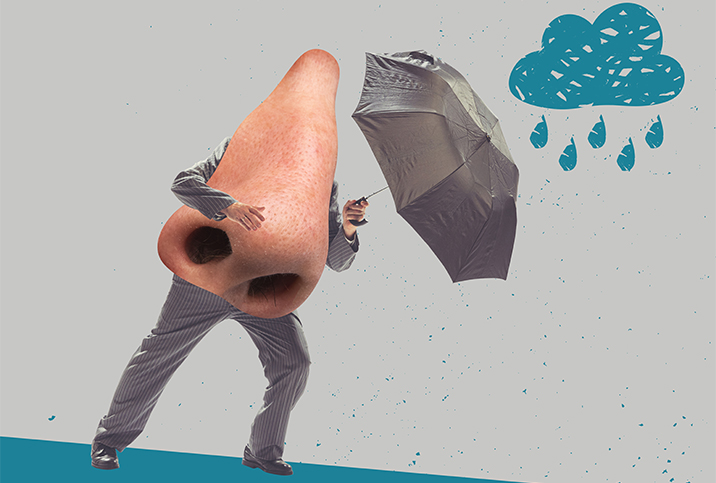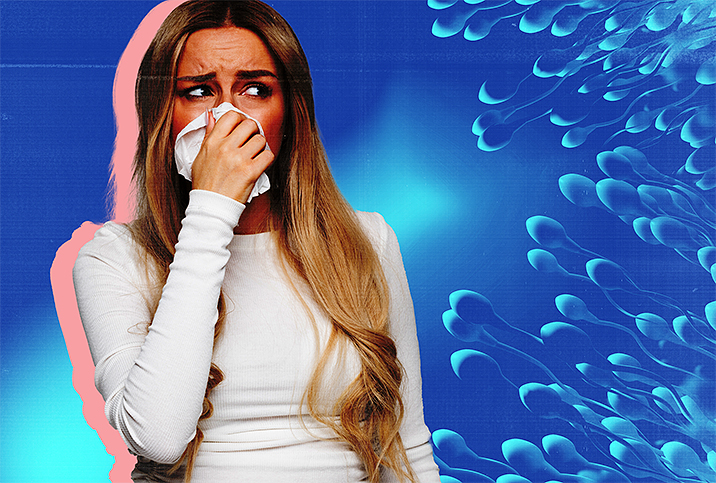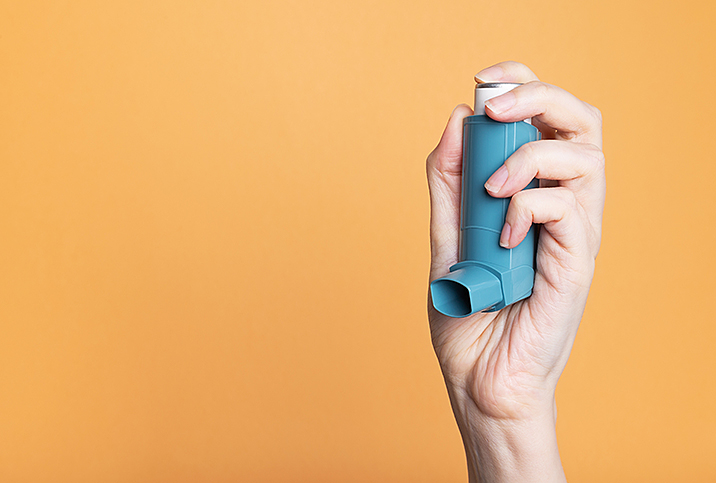Your Allergy Season Survival Guide

In the United States, more than 50 million people suffer from allergies each year. From minor irritation to a full-blown allergy attack, allergens impact individuals' health in many ways. If you're prone to allergies, it's best to equip yourself with a how-to guide for dealing with this common phenomenon.
What are allergies?
Your body's immune system is constantly on the lookout for foreign substances and potential threats. Antibodies, proteins produced by the immune system, react to these external stimuli. According to Sophie Vergnaud, M.D., a physician in San Francisco and medical editor at GoodRx, allergic reactions occur when a harmless substance is perceived as a threat to the body. Think of it as a simple case of mistaken identity.
"Basically, the immune system overreacts by producing antibodies that attack the allergen," said Robert Weitz, who deals regularly with indoor allergens as an environmental testing expert, certified microbial investigator and founder of RTK Environmental Group, based in the northeastern U.S.
When this "attack" happens, allergy symptoms arise, and the severity of allergic reactions varies from person to person.
"Allergies affect the body by causing a cascade of inflammation triggered by a chemical called histamine, which is released when your allergy cells are triggered by an allergen," explained Purvi Parikh, M.D., a clinical assistant professor, allergist and immunologist at NYU Langone Health in New York City.
Vergnaud said allergies commonly cause dermatological, respiratory and gastrointestinal problems, along with potentially life-threatening reactions.
"Almost anything in our environment can be an allergen," she explained. "Genetics is a risk factor: If both parents have allergies, then the risk for the child can be as high as 80 percent."
However, she negated claims that junk foods and immunizations cause allergies.
Allergy symptoms can put a damper on sexual health. In one survey, 83 percent of participants with allergic rhinitis said the condition affected their sex lives occasionally, and the other 17 percent were impacted almost all the time. It's been theorized that this negative impact is due to a combination of factors, including a decreased sense of smell, fatigue and the appearance of unsavory allergic reactions.
Mucus blocks the sinuses, preventing you from picking up on pheromones involved in sexual arousal, and fatigue decreases sex drive and satisfaction. Plus, blotchy red eyes and constant sniffling aren't usually turn-ons for either party, and the sufferer can feel self-conscious.
There is the chance of closeness being a problem—believe it or not, it's possible to develop symptoms through secondhand contact if you're sensitive to products your partner is using. For congestion, use a non-drowsy allergy medication or nasal spray beforehand. Having sex in positions where gravity works in your favor helps, too. For instance, lying down pulls mucus back into the nose and worsens blockage, while standing or sitting positions do the opposite.
Experts named food, skin, drugs, insects, pollen or seasonal conditions, as well as indoor allergens such as mold, pets, dander and dust, as the most notable culprits for allergies. In addition, many materials and substances, such as latex, perfume and jewelry, can spur an allergic reaction. Even bodily fluids can be laden with allergenic properties.
Persistent allergies accompanied by respiratory issues can be indicative of asthma. Check with your primary doctor in case you require medical treatment.
Parikh and Vergnaud warned that anaphylaxis is a life-threatening allergic reaction requiring immediate medical attention and the use of an epinephrine device if one is owned. Rashes that arrive with breathing issues, gastrointestinal problems, dizziness or loss of consciousness may indicate anaphylaxis.
Allergens by region
Throughout the U.S., allergen disparity is vast. Seasonal allergies involve different levels of environmental triggers, and pollen and humidity levels are two of the most notable variables.
Different allergens fluctuate depending on the region. For example, certain plants (and their pollen) are more prevalent in one area than another due to climate—it's safe to say you see far more cacti in scrub biomes than in forest biomes. However, because each zone in the country has its own cluster of similar ecosystems, their proximity may mean they share allergens throughout the year.
"On the East Coast, common allergens are tree pollen, weed pollen, ragweed pollen and grass pollen," Parikh said. "Texas is known for mountain cedar, but areas in the Southwest are known for mulberry trees and olive tree pollen versus the Northeast, which is known for birch, cedar, oak and maple trees."
She added that though some indoor allergies are universal, some regions have varying levels of dust mites depending on humidity—they thrive on the East Coast, where humidity levels are high, and avoid places like Arizona, which has notoriously low humidity. Parikh also mentioned cockroach allergies, which are more potent in major cities than in suburbs.
Living with allergies
As the first course of action, Weitz recommended identifying the allergen itself to rule out other potential sources. This process includes isolating whether the allergen is outdoor or indoor. If the allergen is more prevalent indoors, he recommended having your home or work environment tested for air quality by a reputable company to detect allergic-reaction-inducing volatile organic compounds (VOCs) before seeking further attention. He emphasized this procedure because VOCs are the cause of 80 percent of indoor air-quality issues, which directly feed back into allergy severity.
Parikh and Vergnaud suggested that if you know the allergen, take medications to treat and prevent allergy symptoms prior to exposure. Milder eye or nasal symptoms can be controlled by over-the-counter antihistamines, corticosteroids and decongestants, which can be used topically or orally.
You can also take some minor precautions to combat allergies. If your trigger is pollen, learn when concentrations are high and avoid going outdoors to prevent inhaling too much of it. Wearing protective wear—such as a hypoallergenic cycle/motorcycle helmet or a face mask—is beneficial for reducing the risk of harmful inhalation. People with asthma, especially those with higher sensitivity, should keep an inhaler ready in case of severe allergy symptoms.
If the problem is mold, assure your home or everyday environment is free of excess moisture or humidity. Pet-related allergy sufferers should keep animals out of the bedroom and confirm home textiles are clean and free of pet dander, hair and dried saliva. Beware of potential allergens within cohabitants' belongings, including cleaning and personal hygiene products.
People with food allergies should be aware of the exact ingredients in anything they eat, whether the products are purchased in a store or a restaurant. For example, someone with debilitating peanut allergies should avoid eating peanuts and peanut butter, and check before eating other items in case they've been made with peanut oil or derivatives.
For less drastic symptoms, Vergnaud listed eye drops, inhalers, nose sprays and skin products as common topical treatments. However, she advised caution: If the allergen isn't avoidable and medications aren't sufficient, you may need immunotherapy.
"Immunotherapy is a specific treatment for a small number of people with severe and persistent allergies who can't get their symptoms under control with other treatments," Vergnaud said. "It involves taking small doses of the allergic trigger [allergen] over the course of several years. It aims to help your body get used to the allergen so your allergy becomes milder and more manageable."
The allergen can be administered either as a shot (subcutaneous immunotherapy, SCIT) or as a drop (sublingual immunotherapy, SLIT), she added.
If allergy symptoms are causing you distress or harming your public and private life, it's probably time to see your doctor and ask for a recommendation for a good allergist. Together, you'll be able to draft a plan to prevent and treat your allergy, and most importantly, survive allergy season.




















